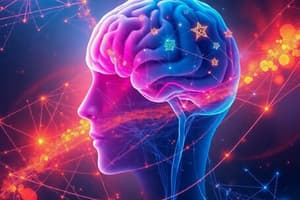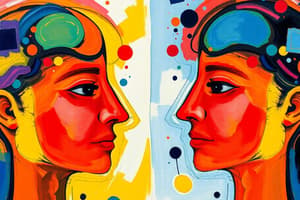Podcast
Questions and Answers
In the context of psychological assessment, what distinguishes a formal assessment from an informal assessment?
In the context of psychological assessment, what distinguishes a formal assessment from an informal assessment?
- Formal assessments are used for research purposes, while informal assessments are used in clinical settings.
- Formal assessments are objective, standardized, and organized, whereas informal assessments vary and are open to subjective interpretations. (correct)
- Formal assessments are conducted by trained psychologists, while informal assessments can be done by anyone.
- Formal assessments rely on subjective interpretations, while informal assessments are objective and standardized.
How does the concept of 'situationism' challenge traditional views on individual behavior?
How does the concept of 'situationism' challenge traditional views on individual behavior?
- It emphasizes the influence of external factors and circumstances on behavior, sometimes overriding personality traits. (correct)
- It argues that behavior is solely a result of genetic predispositions.
- It suggests that personal traits are the primary determinants of behavior across all situations.
- It combines personal traits and external factors equally to determine behavior.
How does the information-processing approach differ from the psychometric approach in understanding intelligence?
How does the information-processing approach differ from the psychometric approach in understanding intelligence?
- The information-processing approach expresses intelligence as an aggregate of abilities, while the psychometric approach focuses on how an intelligent person acts.
- The information-processing approach focuses on the structure of intelligence, while the psychometric approach focuses on the processes involved in intellectual reasoning.
- The information-processing approach and psychometric approach are similar, with minor differences.
- The information-processing approach describes the processes people use in intellectual reasoning and problem-solving, while the psychometric approach considers intelligence as an aggregate of abilities. (correct)
What is the key distinction between 'g-factor' and 's-factors' in Spearman's two-factor theory of intelligence?
What is the key distinction between 'g-factor' and 's-factors' in Spearman's two-factor theory of intelligence?
In Guilford's structure-of-intellect model, which dimension refers to the nature of the materials or information on which intellectual operations are performed?
In Guilford's structure-of-intellect model, which dimension refers to the nature of the materials or information on which intellectual operations are performed?
According to Gardner's theory of multiple intelligences, what does it mean when intelligences are 'independent of each other'?
According to Gardner's theory of multiple intelligences, what does it mean when intelligences are 'independent of each other'?
In the context of Sternberg's triarchic theory of intelligence, how does experiential intelligence manifest?
In the context of Sternberg's triarchic theory of intelligence, how does experiential intelligence manifest?
What is the primary function of the 'planning' component in the PASS model of intelligence?
What is the primary function of the 'planning' component in the PASS model of intelligence?
How is 'talent' distinct from 'giftedness'?
How is 'talent' distinct from 'giftedness'?
In the context of cultural influences on intelligence, what characterizes 'technological intelligence'?
In the context of cultural influences on intelligence, what characterizes 'technological intelligence'?
Flashcards
Individual Differences
Individual Differences
Distinctiveness and variations among people's characteristics and behaviour patterns.
Psychological Assessment
Psychological Assessment
Systematic testing procedures to evaluate abilities, behaviours, and personal qualities.
Intelligence
Intelligence
The global capacity to understand the world, think rationally, and use available resources effectively when faced with challenges.
Aptitude
Aptitude
Signup and view all the flashcards
Interest
Interest
Signup and view all the flashcards
Personality
Personality
Signup and view all the flashcards
Values
Values
Signup and view all the flashcards
Psychological Test
Psychological Test
Signup and view all the flashcards
Case Study
Case Study
Signup and view all the flashcards
Creativity
Creativity
Signup and view all the flashcards
Study Notes
- Variations occur in how people perceive, learn, think, and perform tasks
- Psychologists study these individual differences
- Intelligence is a key attribute studied by psychologists, involving the ability to understand complex ideas, adapt, learn from experience, reason, and overcome obstacles
Individual Differences in Human Functioning
- Individual differences are common and contribute to the diversity of nature
- Individuals vary in physical and psychological traits, with traits existing in varying degrees
- The study of individual differences examines how and why people differ
- While personal traits influence behavior, situational factors also play a significant role
- Situationism suggests circumstances greatly influence behavior, sometimes causing individuals with differing traits to respond similarly
Assessment of Psychological Attributes
- Psychological attributes are involved in phenomena from reaction time to happiness
- Assessment measures psychological attributes using multiple methods and comparison standards
- Attributes are measured using scientific procedures to ensure validity
- Formal assessments are objective, standardized, and organized, while informal assessments can be subjective
- Psychologists use assessments to predict future behavior and intervene if needed
- Attribute selection depends on the purpose of the assessment
- Psychological assessment uses tests to evaluate abilities, behaviors, and qualities
Domains of Psychological Attributes
- Psychological attributes are complex and multi-dimensional
- Complete assessment requires evaluating cognitive, emotional, and social functioning
- Intelligence: The global capacity to understand, think rationally, and use resources effectively
- Intelligence tests measure general cognitive competence
- Aptitude: An individual's potential for acquiring skills, predicted by aptitude tests
- Interest: An individual's preference for specific activities, influencing satisfaction and performance
- Personality: Enduring characteristics that make individuals distinct, assessed by personality tests to explain and predict behavior
- Values: Enduring beliefs about ideal behavior, guiding actions and judgments, assessed to determine dominant values
Assessment Methods
-
Psychological Test: Objective and standardized measure of mental or behavioral characteristics
-
Used for diagnosis, guidance, selection, placement, and training
-
Objective and projective tests are available
-
Interview: Seeking information from a person on a one-to-one basis
-
Case Study: In-depth study of an individual's psychological attributes and history in context
-
Observation: Recording behavior in real-time using systematic and organized procedures
-
Self-Report: Providing factual information and opinions about oneself
Intelligence
- Intelligence helps understand individual differences and adaptation to the environment
- Psychological intelligence differs from common sense notions
- Intelligent individuals have mental alertness, wit, learning speed, and relational understanding
- Alfred Binet: Intelligence is the ability to judge, understand, and reason well
- Wechsler: Intelligence is the global capacity to think rationally, act purposefully, and deal effectively with the environment
- Other psychologists: Intelligent individuals adapt to and modify the environment
Theories of Intelligence
-
Psychometric Approach: Intelligence as an aggregate of abilities, expressed as a single index
-
Information-Processing Approach: Describes the processes used in intellectual reasoning and problem-solving
-
Alfred Binet's Uni/One Factor Theory: Intelligence consists of one similar set of abilities for solving any problem
-
Charles Spearman's Two-Factor Theory: Intelligence includes a general factor (g-factor) and specific factors (s-factors)
-
g-factor: Mental operations common to all performances
-
s-factor: Specific abilities for excelling in certain domains
-
Louis Thurstone's Theory of Primary Mental Abilities: Intelligence consists of seven independent primary abilities
- Verbal Comprehension
- Numerical Abilities
- Spatial Relations
- Perceptual Speed
- Word Fluency
- Memory
- Inductive Reasoning
-
Arthur Jensen's Hierarchical Model: Intelligence operates at two levels
-
Level I: Associative learning (rote memory)
-
Level II: Cognitive competence (higher-order skills)
-
J.P. Guilford's Structure-of-Intellect Model: Classifies intelligence by operations, contents, and products.
-
Operations: Cognition, memory, production, evaluation
-
Contents: Visual, auditory, symbolic, semantic, behavioral
-
Products: Units, classes, relations, systems, transformations, implications
Theory of Multiple Intelligences
-
Howard Gardner’s Theory of Multiple Intelligences states intelligence has distinct types that are independent of each other
-
Multiple intelligences interact to solve problems
-
Linguistic intelligence involves the ability to produce and use language effectively
-
Spatial intelligence involves forming and using mental images
-
Pilots, sailors, sculptors, painters, and architects often possess spatial intelligence
-
Musical intelligence involves producing and manipulating musical rhythms and patterns
-
Bodily-kinesthetic intelligence involves using the body creatively
-
Interpersonal intelligence involves understanding others’ motives and feelings
-
Intrapersonal intelligence involves understanding one’s own feelings and desires
-
Logical-mathematical intelligence involves logical thinking and problem-solving
-
Naturalistic intelligence involves recognizing features of the natural world
Triarchic Theory of Intelligence
-
Robert Sternberg proposes the triarchic theory
-
Intelligence is the ability to adapt, shape, and select environments
-
This encompasses componential, experiential, and contextual intelligence
-
Componential Intelligence (analytical) is used to analyze information and solve problems, it includes 3 components:
- Knowledge acquisition
- Meta Component
- Performance component
-
Experiential Intelligence (creative) is involved to use past experiences creatively
-
Contextual Intelligence (practical) involves dealing with daily environmental demands adaptively
PASS Model of Intelligence
-
Developed by J.P. Das, Jack Naglieri, and Kirby, says intellectual activity involves interconnected neurological systems
-
Arousal/Attention: Enables attending to stimuli
-
Optimal arousal focuses attention on relevant problem aspects
-
Simultaneous and Successive Processing: Integrates information into knowledge systems
-
Simultaneous processing comprehends relationships in meaningful patterns
-
Successive processing remembers information serially
-
Planning: is essential for intelligence
-
Cognitive Assessment System (CAS): Assesses cognitive functions independent of schooling, for ages 5-18
Individual Differences in Intelligence
- Intelligence is influenced by both hereditary and environmental factors
- Studies show twins and adopted children exhibit intelligence similarities
- Identical twins reared together show high correlation in intelligence, as do those reared apart
- Environmental deprivation lowers intelligence, while enrichment raises it
Assessment of Intelligence
-
Binet and Simon: Created the first intelligence test
-
Mental Age (MA): Intellectual development relative to age group
-
Chronological Age (CA): Biological age from birth
-
William Stern: Created the Intelligence Quotient (IQ)
-
IQ = (MA/CA) × 100
-
Average in population is 100 Distribution of IQ scores approximates a normal curve, symmetrical around the mean
Variations of Intelligence
- Intellectual Disability: Significantly below-average intellectual functioning with deficits in adaptive behavior
- Adaptive behavior: Capacity to be independent and deal effectively with one's environment
- Degree of disability classified as mild, moderate, severe, or profound, they need different degrees of support and care
Intellectual Giftedness
- Individuals display higher performance due to outstanding potential
- Lewis Terman: Studied individuals w/ high IQ's
- Giftedness: Exceptional general ability
- Talent: Remarkable ability in a specific area
- From teachers prospective giftedness means combination of ability, creativity, and commitment
Types of Intelligence Tests
- Individual tests administered one-on-one, require rapport, sensitivity
- Group tests administered to several simultaneously, seek written answers
- Verbal tests require verbal responses, only for literate people
- Non-verbal tests use pictures or illustrations
- Performance tests manipulate objects, easily administered across cultures
- Culture-fair tests: Designed to minimize cultural bias
Culture & Intelligence
-
Intelligence adaptation to environment with culture as a context for intelligence development
-
Vygotsky argued culture provides a social context
-
Technology advanced societies values the skills of reasoning judgement
-
Less societies with technology value emotional and social skills
-
Western culture promotes "technological intelligence," emphasizing analysis, speed, performance, and achievement
Intelligence in Indian Tradition
- Integral Intelligence connect in a social & world environment
- Indian thinkers- Holistic views include non-cognitive processes
- Buddhi: Represents intelligence includes- metal effort determined actions and feelings
- Cognitive Capacity- sensitivity understanding Effective communication
- Social Competence- respect and commitment
- Emotional- self-monitoring
Emotional Intelligence (EI)
- EI Includes emotions, feelings while building on to intelligence
- Is a Skill underlying; appraisal, expression and regulation of emotions, or emotions.
- Salovey and Mayer says the the ability to measure ones own emotions and others discriminations
- Expressed in EQ
Special Abilities
-
Aptitude: Special abilities in a particular field
-
Combination of characteristics that indicate you ability to learn and skills after training
-
Aptitude tests
-
General ability testing
-
Psychologists test to find who is diverse and skills.
Creed
- Variations In Psychology like, personality and attitude
- See differences for creativity In potential For a unique way expression.
- Creativity in solving problems by:
- A. solving with A. novel
- B. an invention
- C. or in new form chemical ways
- Einstein's relativity, Creativity is higher and implied bringing out
- Children develop imaging -a) early years activities -b) in non-verbal ways
- Creativity is determined by, environment factor, motivation, family and commitments
Creativity & Intellilgence
- Debate between them, Example by Sunita= high intellectual Vs. Lacking creativity
- High IQ is not necessary for creative
- It's been showed that not one idea of gifted has even followed thru
- Creativity can take many of intellectual people
- And some are highly attributed
- So what are the attribute for creativity,
- A General, Creativity test Is open- minded which is good.
- B tests allow a Person to to be thinking of question terms and helping individuals direction -C The imagination way Is express-able in Creativity. tests thinking, the ability express in ideas for which direction to go
Studying That Suits You
Use AI to generate personalized quizzes and flashcards to suit your learning preferences.




